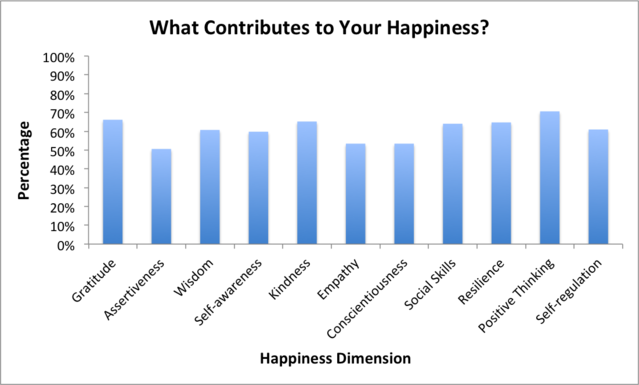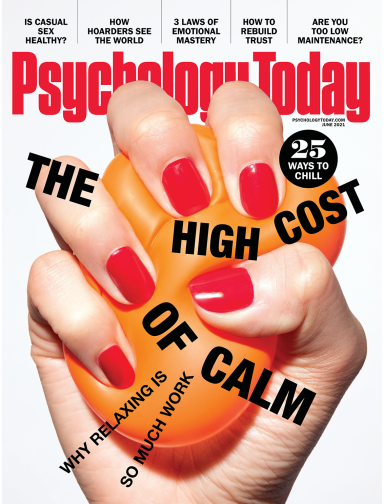What Is Happiness, Anyway?
We know we want happiness. But what exactly is happiness and how do we get it?
Posted September 26, 2020 Reviewed by Ekua Hagan

Happiness is defined differently depending on who you ask. Some people define happiness as a positive emotional experience. Others define happiness as having two parts called hedonia (pleasure) and eudaimonia (thriving). Outside of the scientific world, most of us define happiness as a mixture of positive emotional experiences and a deeper sense of meaning and purpose in life.
What does it mean to be happy?
If we've defined happiness as both positive emotions and meaning in our lives, happiness is a state where we might experience personal positive emotions like contentment, ease, or joy. But we also experience prosocial positive emotions that give us a greater sense of meaning—emotions like connectedness, gratitude , and compassion. Here's a little exercise to help you explore what happiness feels like .
Where does happiness come from?
Although we often think happiness comes from the things that happen to us, science suggests that happiness largely comes from our brains. That's why changing the way we think can increase our happiness even if we make no changes to our lives. For example, when we focus on positive words (by memorizing them) it activates regions of your brain associated with these words. So if I think of the word "adventure," it will likely activate my memories of adventure and the positive emotions associated with adventure.
This not only feels good in the moment, but it can also make it easier to generate these emotions and thoughts in the future. That's because when any region of the brain is activated, it gets stronger. So memorizing or focusing on positive words can make positive concepts, memories, and feelings easier to access in your brain.
Not sure which words are positive? Scientists have measured thousands of words to determine how positive they are. You can Google to create your own positive list of words or use our positive word flashcard book . If you're struggling to shift your thoughts to be more positive, this can be a great way to start activating those "positive" bits in your brain.
How do you define happiness?
Although scientists have their ideas about what happiness is, there are also differences between people in how they define happiness. I've been inviting people to explore and share definitions of happiness on my website for the last few years. And it turns out that regular folks like us define happiness a bit differently than the scientists. Happiness is a bit more about the actions we take in our daily lives. Here are some of the most common examples of what people said their happiness is:
- Family, friends, and relationships
- Sun, nature, and being outdoors
- Doing things you enjoy
- Thought processes like gratitude and self-compassion
- Exercise
- Financial security and safety
- Purposeful work
- Accomplishing, creating, or achieving something
What is happiness made of?
Another way to define happiness is by breaking it down into its parts. For example, how many people believe their happiness comes from gratitude, and how many people believe their happiness comes from empathy? In another activity, I invite people to explore what strategies contribute to happiness from a selection of choices. Here are the percentages of people who believed each skill contributes to their happiness:

What are your happiness values?
Another way to think of your definition of happiness is to explore your happiness values because not all aspects of happiness are equally important to all of us. My ecological mini-study on happiness values resulted in some of the most interesting findings yet. I invite people to share their happiness values , or basically the positive emotions they most value. After analyzing the qualitative data, we found that there were three types of happiness seekers (but some people were more than one of these types).
- The Energy Seeker: Energy seekers value emotions like passion, excitement, enthusiasm, confidence, and feeling triumphant, exhilarated, or inspired.
- The Connection Seeker: Connection seekers value love, connection, appreciation, or being secure.
- The Goal Seeker: Goal seekers value being productive, appreciated, satisfied, and sometimes secure, confident, or proud.
It is possible that knowing which emotions you most value, you can get clearer on your definition of happiness and reach it more easily.
How to create happiness
Now that we know what happiness is, how do we create it? Well, there are lots of different happiness skills we can build. Which of these happiness-boosting skills to build depends on you, and what happiness-boosting skills you struggle with most ( take this quiz to learn more about your happiness strengths and weaknesses ). When we focus on building the skills we struggle with most, we can more usually more effectively boost our happiness.
Once you know what skills to build, use happiness-boosting activities that build these skills. For example, you could practice positive reappraisal , learn how to capitalize on your strengths , or manifest experiences in your life that give you more meaning .
Even more ways to create happiness:
- Learning how to think positively
- Cultivating resilience
- Practicing gratitude
- Improving social relationships
- Practicing mindfulness
- Improving your positive emotional attention
- Savoring the moment
- Imagining your best self
Check out my list of 101 ways to get happier here .
Turn your happiness definition into a map
Whenever we want to accomplish anything, we benefit from creating a plan or map to get there. The same is true for happiness. So once you know what happiness is and how you define happiness you can start growing your happiness .
But as you go, be careful not to be too hard on yourself. We all struggle from time to time and we are happier if we can self-compassionate towards ourselves. We really can increase our happiness one baby step at a time if we believe in ourselves.
If you want to learn more about what happiness is, check out this video on the longest study of happiness:














